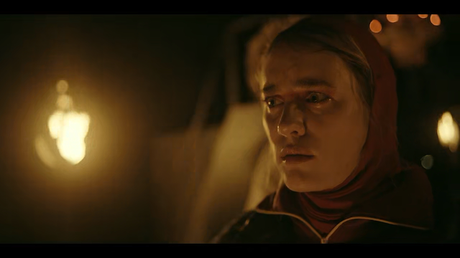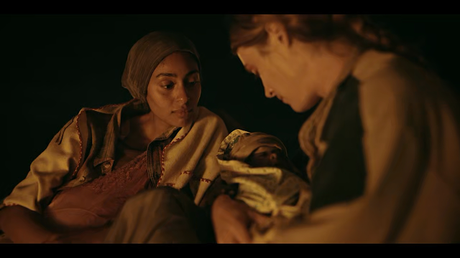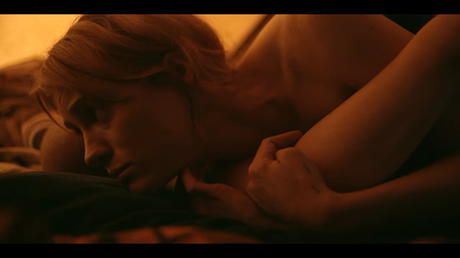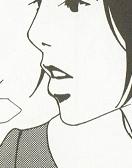Station Eleven: 1x02 A Hawk from a Handsaw.

To the monsters, we’re the monsters.
This hasn’t really been a prominent part of the show yet, but I think about what it would have meant for eight-year-old Kirsten to walk into Arthur Leander’s room and be taken seriously as an aspiring actress, to receive advice, to have this experience as a young child. It would be a stand-out occasion even if the rest of her life had turned out differently, if the plague had never happened. We know, from throwaway comments, that Arthur was a film star stretching himself with his performance as Lear on stage, that he was not taken seriously, doubted, but to Kirsten, he must have seemed magnificent. I don’t think that without his influence, she would have proclaimed wanting to be an actress quite so confidently to Javeen when he asked her, or that she would have pursued this goal, against all odds, even after the apocalypse.
The other insight is that in spite of all of that, Kirsten did not have a normal childhood. When we meet her, feral and untrusting, two years later, on her own, when she first comes across Sarah, the Conductor (the composer, working on her twentieth symphony in the equivalent of Now, maybe one for each year), she is a changed person from the one that Jeevan saved. She’s lost Jeevan and Frank along the way, on what we later find out was a gruelling trek across a frozen Lake Michigan. Frank, shown in flashbacks to have a bad leg, didn’t even come with them so far, but we have yet to find out what happened to Jeevan, what haunts Kirsten so much about his death that she discusses ghosts with her friends.

But, in any case, it is a fateful meeting – a girl who confidently declares herself to be a Shakespearean actress (when she says that Arthur Leander taught her, Sarah responds by saying “We can overcome that”) coming across the conductor of the The Traveling Symphony , a Shakespearean theater company on wheels. Twenty years later, and Kirsten has become the lead actress of the company, famous enough in this world beyond electricity to be welcomed by shouting children when they arrive at the settlement where they will perform Hamlet later. We are still missing a lot of these inbetween years, but this episode reveals a few things about Kirsten – in an encounter with two strangers, she is fiercely protective of her friends, and upon questioned about her tattoos, claims that each of them stands for someone she killed (a claim backed up by the events at the end of the episode). She has made a close-knit family here, one in which tents appear to be shared regularly, and maybe the acting advice that Leander gave her years ago applies to everything she does in her life know: it’s not about her, it’s about whoever she is facing. At this particular moment, it is the prospect of her friend and former lover settling down in this village to raise her newborn, a prospect she cannot fathom – the wheel, the company, is everything to Kirsten, a life outside of it unimaginable.

While she performs as Hamlet, Kirsten has flashbacks to the first weeks with Jeevan and Frank, to finding out about her parents’ death from impersonal text messages, the grief of losing parents (that is now tangled up with the grief of losing her replacement father, Jeevan, and her brother of sorts, Frank). We realize that she is such a good actress because she channels all of those feelings into her performance. Afterwards, while Alex sings a dirge, a lament for the death, not just for the stranger they met earlier that day but for everyone they have all lost, Kirsten approaches that stranger, and points out all the mistakes in his story – and then she stabs him after refusing him entrance into her community, after he threatens that her friends will begin disappearing if she does not admit him. It’s a reminder that Kirsten is not just the lead actress, but also the protector of the Symphony, the person who has knives sewn into her costumes, who bears tattoos of those she killed before. The stranger threatens her – the first hints of a cult, of an ideology. “To the monsters, we’re the monsters.”, he says again, and Kirsten knows those words.
Random notes:
How great is it to see Lori Petty again, and in such a great role.
The title of the episode is fitting and from Hamlet - about perceiving reality and tell things apart - which is what Kirsten does when she sees through the stranger's story, and realises he is a threat to her community.
After their first performance of Hamlet, Sarah is approached by an emissary of the Museum of Civilization (played by the great Enrico Colantoni). He invites them to their settlement which they have kept secret, but Sarah turns him down rather rudely, saying that they never leave the “wheel”.
The conductor tells Kirsten that the children in the company are the only good actors because everyone else is too traumatised – which is an interesting statement, considering that arguably, Kirsten is such a good actress because she is traumatised.
Oh Dan! His fifth audition for the company is the speech from Independence Day, and he finally gets the gig. Let’s hope nothing bad happens to Dan.
In a great moment, Kirsten explains ridesharing apps to Alex, who must be too young to remember the world before, personifying the generational rift that the plague would have created.
A blink and you miss it appearance by Ess Hödlmoser (in Kirsten’s tent!), who has been great in this year’s season of Motherland: Fort Salem.
We don’t know much about the cult yet, but the stranger’s comments about “Day Zero pain” hint at what the core of it is.

